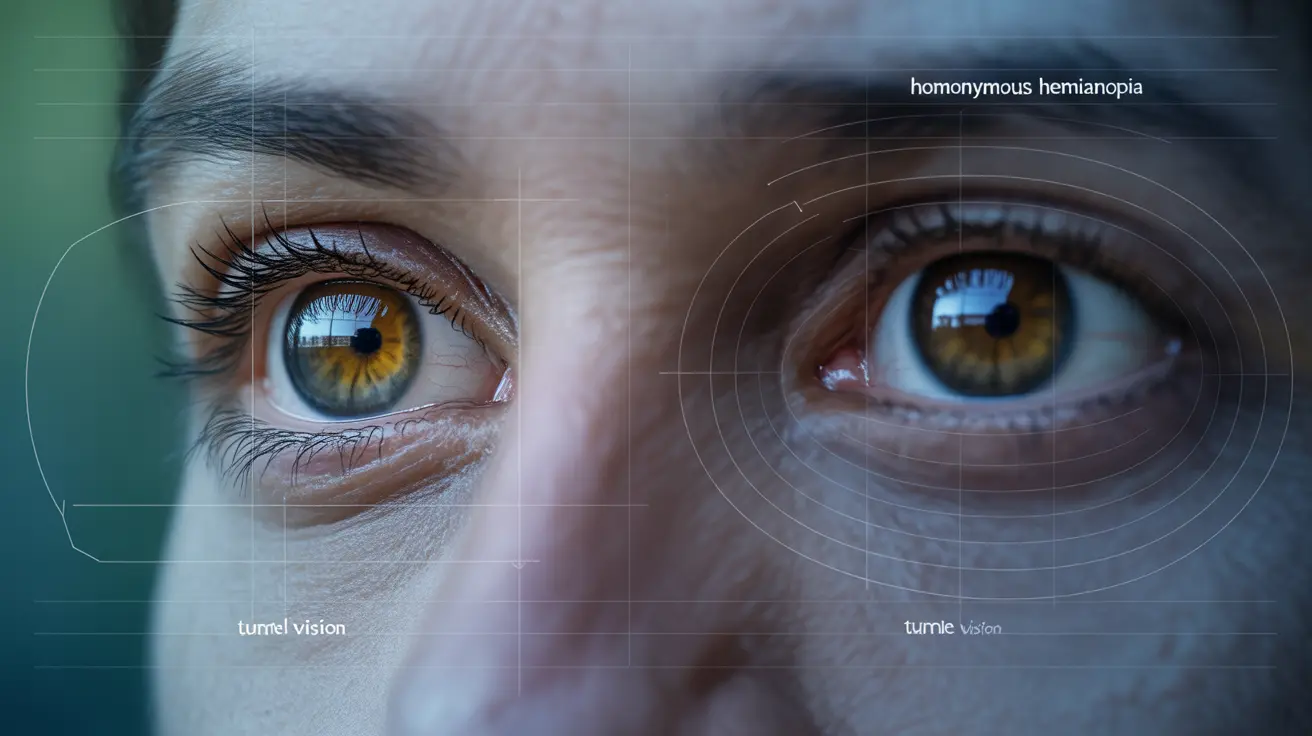Peripheral vision loss due to neurological conditions can significantly impact daily life and may signal serious underlying health issues. Understanding the connection between brain health and vision is crucial for early detection and proper treatment of these conditions.
In this comprehensive guide, we'll explore the various neurological disorders that can affect peripheral vision, their symptoms, and available treatment options. Early recognition of these symptoms can lead to better outcomes and help preserve vision.
Common Neurological Conditions Affecting Peripheral Vision
Several neurological conditions can impact your peripheral vision, ranging from acute conditions to chronic progressive disorders. Understanding these conditions is essential for proper diagnosis and treatment.
Stroke and Vision Changes
Strokes can significantly affect vision by damaging specific areas of the brain responsible for visual processing. Common visual effects of stroke include:
- Homonymous hemianopia (loss of vision in the same field of both eyes)
- Sudden onset of vision loss
- Visual field cuts
- Difficulty with spatial awareness
Immediate medical attention is crucial when experiencing sudden vision changes, as early intervention can help minimize permanent damage.
Brain Tumors and Visual Field Defects
Brain tumors can cause progressive vision loss by putting pressure on the optic nerves or visual pathways. Key characteristics include:
- Gradual development of tunnel vision
- Progressive loss of peripheral vision
- Potential headaches and other neurological symptoms
- Vision changes that may be worse in one eye
Multiple Sclerosis and Vision Impact
Multiple sclerosis (MS) can affect vision in various ways, including peripheral vision loss. Common manifestations include:
- Optic neuritis
- Temporary vision loss
- Visual field defects
- Double vision or blurred vision
Diagnosis and Assessment
Proper diagnosis of neurologically-caused peripheral vision loss requires comprehensive evaluation, including:
- Visual field testing
- Neurological examination
- Brain imaging (MRI or CT scans)
- Ophthalmological assessment
Treatment Approaches
Treatment strategies vary depending on the underlying cause and may include:
- Medical intervention for the primary neurological condition
- Vision rehabilitation therapy
- Compensatory strategies for vision loss
- Regular monitoring and follow-up care
Prevention and Management
While not all neurological causes of vision loss can be prevented, certain measures can help manage risk:
- Regular medical check-ups
- Blood pressure control
- Healthy lifestyle choices
- Early intervention when symptoms appear
Frequently Asked Questions
What neurological conditions can cause loss of peripheral vision?
Several neurological conditions can cause peripheral vision loss, including strokes, brain tumors, multiple sclerosis, intracranial hypertension, and certain types of migraine. Each condition affects vision through different mechanisms, such as pressure on optical pathways or damage to brain tissue responsible for vision processing.
How does a stroke affect peripheral vision and what symptoms should I watch for?
A stroke can cause sudden loss of peripheral vision, typically affecting the same side in both eyes (homonymous hemianopia). Key symptoms include sudden vision loss, difficulty seeing objects to one side, bumping into objects, and problems with spatial awareness. These symptoms often occur alongside other stroke symptoms like facial drooping or weakness on one side.
Can brain tumors lead to tunnel vision or other peripheral vision loss?
Yes, brain tumors can cause tunnel vision or peripheral vision loss by putting pressure on the optic nerves or visual pathways in the brain. This vision loss typically develops gradually and may be accompanied by headaches, nausea, or other neurological symptoms. The pattern of vision loss depends on the tumor's location and size.
How is peripheral vision loss from neurological causes diagnosed and treated?
Diagnosis involves comprehensive testing including visual field tests, neurological examinations, and brain imaging (MRI or CT scans). Treatment depends on the underlying cause and may include addressing the primary condition (such as tumor removal or stroke treatment), vision rehabilitation, and compensatory strategies to help manage vision loss.
Can multiple sclerosis cause loss of peripheral vision, and what are the warning signs?
Yes, multiple sclerosis can cause peripheral vision loss, often through optic neuritis. Warning signs include pain with eye movement, temporary vision loss, color vision changes, and visual field defects. These symptoms may come and go during MS relapses and should be reported to a healthcare provider immediately.




